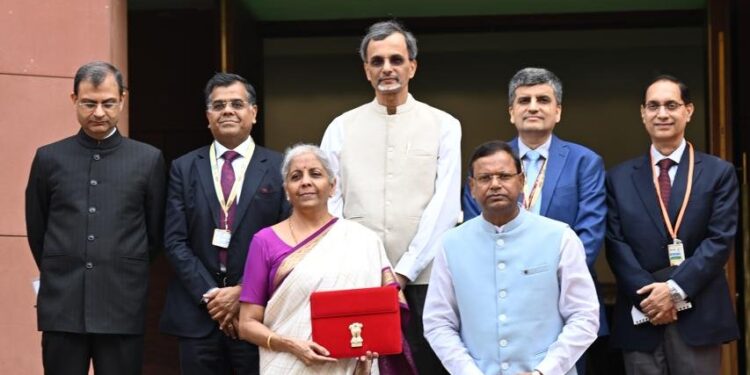The Union Minister of Finance and Corporate Affairs Smt. Nirmala Sitharaman presented the Union Budget 2024-25 in Parliament on July 23.
Here are some of the highlights of the budget :
Budget Estimates 2024-25:
- Total receipts other than borrowings: 32.07 lakh crore.
- Total expenditure: 48.21 lakh crore.
- Net tax receipt: 25.83 lakh crore.
- Fiscal deficit: 4.9% of GDP.
The government aims to reach a deficit below 4.5 per cent next year. Inflation continues to be low, stable and moving towards the 4% target; Core inflation (non-food, non-fuel) at 3.1%.
Employment and Skilling
Prime Minister’s package of 5 schemes and initiatives for Employment, Skilling and other opportunities, for 4.1 crore youth, over 5 years.
- Scheme A – First Timers: One-month salary of up to `15,000 to be provided in 3 instalments to first-time employees, as registered in the EPFO.
- Scheme B – Job Creation in manufacturing: Incentive to be provided at specified scale directly, both employee and employer, to their EPFO contribution in the first 4 years of employment.
- Scheme C – Support to employers: Government to reimburse up to `3,000 per month for 2 years towards EPFO contribution of employers, for each additional employee.
- New centrally sponsored scheme for Skilling
- 20 lakh youth to be skilled over 5 years.
- 1,000 Industrial Training Institutes to be upgraded in hub-and-spoke arrangements.
- New Scheme for Internship in 500 Top Companies to 1 crore youth in 5 years
Skill Development
- New centrally sponsored scheme for Skilling under Prime Minister’s Package for 20 lakh youth over 5 years.
- Model Skill Loan Scheme to be revised to facilitate loans up to
`7.5 lakh. - Financial support for loans up to 10 lakh for higher education in domestic institutions to be provided to youth who have not been eligible for any benefit under government schemes and policies.
Urban Development
Transit Oriented Development
- Formulation of Transit-Oriented Development plans and strategies to implement and finance 14 large cities with a population above 30 lakh.
Urban Housing
- Investment of 10 lakh crore, including the central assistance of 2.2 lakh crore in the next 5 years, under PM Awas Yojana Urban 2.0 proposed to address the housing needs of 1 crore urban poor and middle-class families.
Street Markets
- New scheme to support the development of 100 weekly ‘haats’ or street food hubs every year for the next 5 years in select cities.
Next-gen reforms
Rural land related actions
- Unique Land Parcel Identification Number (ULPIN) or Bhu-Aadhaar for all lands
- Digitization of cadastral maps
- Survey of map sub-divisions as per current ownership
- Establishment of a land registry
- Linking to the farmer’s registry
Urban land related actions
- Land records in urban areas to be digitized with GIS mapping.
NPS Vatsalya
- NPS-Vatsalya, a plan for contribution by parents and guardians for minors will be started. On attaining the age of majority, the plan can be converted seamlessly into a normal NPS account.
Taxes
Indirect taxes
- Buoyed by GST’s success, tax structure to be simplified and rationalised to expand GST to remaining sectors.
- Three cancer drugs namely TrastuzumabDeruxtecan, Osimertinib and Durvalumab fully exempted from customs duty.
- Basic Customs Duty on mobile phones, mobile Printed Circuit Board Assembly (PCBA) and mobile charger reduced to 15%.
- Customs duties on gold and silver reduced to 6% and that on platinum to 6.4%.
- Basic Customs Duty on PVC flex banners increased from 10 to 25%.
- Capital goods for use in the manufacture of solar cells and panels exempted from customs duty.
Simplification for Charities and of TDS
- Two tax exemption regimes for charities to be merged into one.
- 5% TDS rate on many payments merged into 2% TDS rate.
- 20% TDS rate on repurchase of units by mutual funds or UTI withdrawn.
- TDS rate on e-commerce operators reduced from 1 to 0.1%.
- Delay for payment of TDS up to due date of filing statement decriminalized.
Simplification and Rationalisation of Capital Gains
- Short-term gains on certain financial assets to attract a tax rate of 20%.
- Long-term gains on all financial and non-financial assets to attract a tax rate of 12.5%.
- Exemption limit of capital gains on certain financial assets increased to ₹ 1.25 lakh per year.
Other taxes
- Angel tax for all classes of investors abolished to bolster start-up eco-system.
- Security Transactions Tax on futures and options of securities increased to 0.02% and 0.1% respectively.
- Income received on the back of shares in the hands of the recipient to be taxed.
- Simpler tax regime for foreign shipping companies operating domestic cruises to promote cruise tourism in India.
- Deduction of expenditure by employers towards the National Pension Scheme to be increased from 10 to 14 per cent of the employee’s salary.












